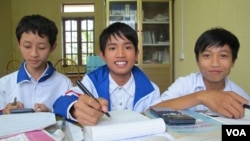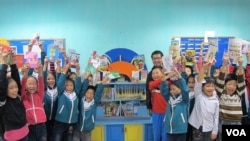THAI BINH, VIETNAM —
In Vietnam, aid groups warn that low-quality education is preventing the country’s ascendance from middle-income status. But one man is trying to change that by building community-funded libraries in schools.
At the An Bai primary school in Thai Benh province, a group of children rush to grab books from a teacher and place them on a set of shelves at the back of the classroom. The books are part of a campaign by 37-year-old Nguyen Quang Thach to provide so-called “parent libraries” in rural schools.
Farmers in communities like this have little access to books, Thach says. Most schools have enough textbooks but few families have additional reading materials.
"When I make the survey with the school I interview lots of farmers, workers and lots of students," he said. "They come from rural areas. They said that they have never come to the school library to read. Many people don’t think the school has a library. So library in the school system is kind of a store room, not a real space for reading.”
High literacy rate
Education is a hot topic in Vietnam, where high literacy rates come despite old-fashioned teaching methods and corruption that undermines schooling.
Although the country boasts a more than 90 percent literacy rate for a mostly rural population, aid groups say there is a gap between what schools teach and what the country’s workers need to know.
Academic performance at Vietnamese schools also remains relatively low compared to other countries in the region. A big part of the problem is bribery, and state-run media often carry stories of teachers being reprimanded for giving high grades in exchange for money. Heavy reliance on dictation methods in the classroom, according to some analysts, also means Vietnamese students are not encouraged to think for themselves or develop innovative problem solving.
Investing in books
Busy libraries filled with books could be one part of the solution. Thach works with publishers in Hanoi to provide a list of titles at discount rates for teachers and students to choose from.
He says that he is also looking to change attitudes about philanthropy in Vietnam, where it is common for people to spend thousands of dollars building a new cultural house or gate to the village as a symbol of wealth and status.
“The real thing is knowledge, not something show off, like big temple, or big money for the wedding, big money for the ancestors’ anniversary, they should use money for the better thing, invest for future, it’s books," he said.
So far nearly 1,000 parental libraries have been built with hundreds of titles each, and Thach’s model has been replicated in several provinces across the country. For each school Thach helps build libraries in up to four classes, and then others replicate the model. Parents hand over $3 each for the first year and $1 in subsequent years.
Thach’s model
Headmaster at An Duc secondary school, Pham Duc Duong, says thanks to Thach’s model, the quality of education at the school is higher.
He says students have been getting better results for competitions, especially in social science.
Duong Le Nga, head of the school youth group, says after the libraries were built students started asking the teachers more questions. She thinks Thach’s model helps students think "outside the box."
Nga says students have started setting up their own debating clubs in the classroom. Each class has three or four clubs on different subjects. Now, instead of relying on the teacher for materials, they run the clubs themselves.
Deputy head of the school, Uong Minh Thanh, says many of the students here will become workers in nearby factories. However, after seeing the influence of the new libraries, he hopes the children will have higher ambitions for themselves when they graduate.
He says the libraries have encouraged peer reading amongst students and teachers and for families when the children takes books home.
Although Thach’s model targets Vietnam’s poor farmers, it does not include ethnic minorities. Despite making up only 14 percent of the population, these groups account for two fifths of the nation’s poor.
Thach says he plans to extend the model to ethnic minority school children next year but books will be provided in Vietnamese, a second language for most and literacy levels are low.
Thach says his dream is that one day his model will be self-sustainable and he will not be needed any more. In the meantime, he says he hopes his "book revolution" can help Vietnamese farmers stand equal to people in developed countries.
At the An Bai primary school in Thai Benh province, a group of children rush to grab books from a teacher and place them on a set of shelves at the back of the classroom. The books are part of a campaign by 37-year-old Nguyen Quang Thach to provide so-called “parent libraries” in rural schools.
Farmers in communities like this have little access to books, Thach says. Most schools have enough textbooks but few families have additional reading materials.
"When I make the survey with the school I interview lots of farmers, workers and lots of students," he said. "They come from rural areas. They said that they have never come to the school library to read. Many people don’t think the school has a library. So library in the school system is kind of a store room, not a real space for reading.”
High literacy rate
Education is a hot topic in Vietnam, where high literacy rates come despite old-fashioned teaching methods and corruption that undermines schooling.
Although the country boasts a more than 90 percent literacy rate for a mostly rural population, aid groups say there is a gap between what schools teach and what the country’s workers need to know.
Academic performance at Vietnamese schools also remains relatively low compared to other countries in the region. A big part of the problem is bribery, and state-run media often carry stories of teachers being reprimanded for giving high grades in exchange for money. Heavy reliance on dictation methods in the classroom, according to some analysts, also means Vietnamese students are not encouraged to think for themselves or develop innovative problem solving.
Investing in books
Busy libraries filled with books could be one part of the solution. Thach works with publishers in Hanoi to provide a list of titles at discount rates for teachers and students to choose from.
He says that he is also looking to change attitudes about philanthropy in Vietnam, where it is common for people to spend thousands of dollars building a new cultural house or gate to the village as a symbol of wealth and status.
“The real thing is knowledge, not something show off, like big temple, or big money for the wedding, big money for the ancestors’ anniversary, they should use money for the better thing, invest for future, it’s books," he said.
So far nearly 1,000 parental libraries have been built with hundreds of titles each, and Thach’s model has been replicated in several provinces across the country. For each school Thach helps build libraries in up to four classes, and then others replicate the model. Parents hand over $3 each for the first year and $1 in subsequent years.
Thach’s model
Headmaster at An Duc secondary school, Pham Duc Duong, says thanks to Thach’s model, the quality of education at the school is higher.
He says students have been getting better results for competitions, especially in social science.
Duong Le Nga, head of the school youth group, says after the libraries were built students started asking the teachers more questions. She thinks Thach’s model helps students think "outside the box."
Nga says students have started setting up their own debating clubs in the classroom. Each class has three or four clubs on different subjects. Now, instead of relying on the teacher for materials, they run the clubs themselves.
Deputy head of the school, Uong Minh Thanh, says many of the students here will become workers in nearby factories. However, after seeing the influence of the new libraries, he hopes the children will have higher ambitions for themselves when they graduate.
He says the libraries have encouraged peer reading amongst students and teachers and for families when the children takes books home.
Although Thach’s model targets Vietnam’s poor farmers, it does not include ethnic minorities. Despite making up only 14 percent of the population, these groups account for two fifths of the nation’s poor.
Thach says he plans to extend the model to ethnic minority school children next year but books will be provided in Vietnamese, a second language for most and literacy levels are low.
Thach says his dream is that one day his model will be self-sustainable and he will not be needed any more. In the meantime, he says he hopes his "book revolution" can help Vietnamese farmers stand equal to people in developed countries.

